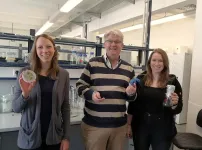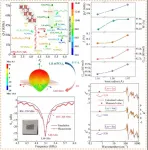(Press-News.org) UNC Greensboro researcher Hemali Rathnayake, Ph.D., has been approved for grant funding from NCInnovation to continue her work in developing a cost-effective and efficient lithium refining process for converting lithium into battery-grade lithium carbonate.
The grant approval is conditioned on standard next steps, including executed grant agreements and formal notification to government partners. This funding is part of NCInnovation’s larger mission to unlock the innovative potential of North Carolina’s world-class universities.
“From mobile phones to automobiles, our everyday modern lifestyle relies on lithium batteries. Purification of lithium is key to battery production, a critical emerging industry at home in Greensboro, our state and surrounding region, and globally. UNC Greensboro is proud of Dr. Hemali Rathnayake and the pioneering research she leads in the development of a cost-effective and efficient lithium refining process. The funding support from state legislators and NCInnovation is vital to continuing this applied research,” said Chancellor Franklin D. Gilliam, Jr.
“Dr. Rathnayake’s lithium refining solutions show incredible promise for North Carolina’s economy,” said Michelle Bolas, NCInnovation Executive Vice President and Chief Innovation Officer. “This work has the capability to help advance our mission to make North Carolina THE innovation state.”
Dr. Rathnayake has led the development of a cost-effective and efficient lithium refining process for converting lithium into battery-grade lithium carbonate (LCE). The global demand for lithium is experiencing substantial growth for its primary role in energy storage, electronic bikes, electrification of tools, and other battery-intense applications. North Carolina has a large and growing lithium and battery industry. Rathnayake’s refining technology has the potential to boost a sustainable domestic supply chain for lithium-based products.
UNC Greensboro researcher Hemali Rathnayake, Ph.D., has been approved for grant funding from NCInnovation to continue her work in developing a cost-effective and efficient lithium refining process for converting lithium into battery-grade lithium carbonate.
The grant approval is conditioned on standard next steps, including executed grant agreements and formal notification to government partners. This funding is part of NCInnovation’s larger mission to unlock the innovative potential of North Carolina’s world-class universities.
“From mobile phones to automobiles, our everyday modern lifestyle relies on lithium batteries. Purification of lithium is key to battery production, a critical emerging industry at home in Greensboro, our state and surrounding region, and globally. UNC Greensboro is proud of Dr. Hemali Rathnayake and the pioneering research she leads in the development of a cost-effective and efficient lithium refining process. The funding support from state legislators and NCInnovation is vital to continuing this applied research,” said Chancellor Franklin D. Gilliam, Jr.
“Dr. Rathnayake’s lithium refining solutions show incredible promise for North Carolina’s economy,” said Michelle Bolas, NCInnovation Executive Vice President and Chief Innovation Officer. “This work has the capability to help advance our mission to make North Carolina THE innovation state.”
Dr. Rathnayake has led the development of a cost-effective and efficient lithium refining process for converting lithium into battery-grade lithium carbonate (LCE). The global demand for lithium is experiencing substantial growth for its primary role in energy storage, electronic bikes, electrification of tools, and other battery-intense applications. North Carolina has a large and growing lithium and battery industry. Rathnayake’s refining technology has the potential to boost a sustainable domestic supply chain for lithium-based products.
UNC Greensboro researcher Hemali Rathnayake, Ph.D., has been approved for grant funding from NCInnovation to continue her work in developing a cost-effective and efficient lithium refining process for converting lithium into battery-grade lithium carbonate.
The grant approval is conditioned on standard next steps, including executed grant agreements and formal notification to government partners. This funding is part of NCInnovation’s larger mission to unlock the innovative potential of North Carolina’s world-class universities.
“From mobile phones to automobiles, our everyday modern lifestyle relies on lithium batteries. Purification of lithium is key to battery production, a critical emerging industry at home in Greensboro, our state and surrounding region, and globally. UNC Greensboro is proud of Dr. Hemali Rathnayake and the pioneering research she leads in the development of a cost-effective and efficient lithium refining process. The funding support from state legislators and NCInnovation is vital to continuing this applied research,” said Chancellor Franklin D. Gilliam, Jr.
“Dr. Rathnayake’s lithium refining solutions show incredible promise for North Carolina’s economy,” said Michelle Bolas, NCInnovation Executive Vice President and Chief Innovation Officer. “This work has the capability to help advance our mission to make North Carolina THE innovation state.”
Dr. Rathnayake has led the development of a cost-effective and efficient lithium refining process for converting lithium into battery-grade lithium carbonate (LCE). The global demand for lithium is experiencing substantial growth for its primary role in energy storage, electronic bikes, electrification of tools, and other battery-intense applications. North Carolina has a large and growing lithium and battery industry. Rathnayake’s refining technology has the potential to boost a sustainable domestic supply chain for lithium-based products.
UNC Greensboro researcher Hemali Rathnayake, Ph.D., has been approved for grant funding from NCInnovation to continue her work in developing a cost-effective and efficient lithium refining process for converting lithium into battery-grade lithium carbonate.
The grant approval is conditioned on standard next steps, including executed grant agreements and formal notification to government partners. This funding is part of NCInnovation’s larger mission to unlock the innovative potential of North Carolina’s world-class universities.
“From mobile phones to automobiles, our everyday modern lifestyle relies on lithium batteries. Purification of lithium is key to battery production, a critical emerging industry at home in Greensboro, our state and surrounding region, and globally. UNC Greensboro is proud of Dr. Hemali Rathnayake and the pioneering research she leads in the development of a cost-effective and efficient lithium refining process. The funding support from state legislators and NCInnovation is vital to continuing this applied research,” said Chancellor Franklin D. Gilliam, Jr.
“Dr. Rathnayake’s lithium refining solutions show incredible promise for North Carolina’s economy,” said Michelle Bolas, NCInnovation Executive Vice President and Chief Innovation Officer. “This work has the capability to help advance our mission to make North Carolina THE innovation state.”
Dr. Rathnayake has led the development of a cost-effective and efficient lithium refining process for converting lithium into battery-grade lithium carbonate (LCE). The global demand for lithium is experiencing substantial growth for its primary role in energy storage, electronic bikes, electrification of tools, and other battery-intense applications. North Carolina has a large and growing lithium and battery industry. Rathnayake’s refining technology has the potential to boost a sustainable domestic supply chain for lithium-based products.
END
UNC Greensboro researcher approved for NCInnovation grant funding for lithium refining research
2024-05-17
ELSE PRESS RELEASES FROM THIS DATE:
Plants restrict use of “Tipp-Ex proteins”
2024-05-17
Plants have special corrective molecules at their disposal that can make retrospective modifications to copies of genes. However, it would appear that these “Tipp-Ex proteins” do not have permission to work in all areas of the cell, only being used in chloroplasts and mitochondria. A study by the University of Bonn has now explained why this is the case. It suggests that the correction mechanism would otherwise modify copies that have nothing wrong with them, with fatal consequences for the cell. The findings have now been ...
New AI tool to help beat brain tumors
2024-05-17
A new AI tool to more quickly and accurately classify brain tumours has been developed by researchers at The Australian National University (ANU).
According to Dr Danh-Tai Hoang, precision in diagnosing and categorising tumours is crucial for effective patient treatment.
“The current gold standard for identifying different kinds of brain tumours is DNA methylation-based profiling,” Dr Hoang said.
“DNA methylation acts like a switch to control gene activity, and ...
Antioxidant Dietary Supplement “Twendee X®” can help counter systemic sclerosis
2024-05-17
Autoimmune diseases occur when the body’s immune system attacks healthy cells instead of protecting them. Systemic sclerosis (SSc) is one such autoimmune condition characterized by faulty circulatory and immune systems, leading to the occurrence of fibrosis (hardening and scarring of healthy tissue) of the skin and internal organs. SSc is known to affect patients throughout their lives, thereby, impairing their quality of life. Although precise mechanisms underlying SSc development and progression are not clearly understood, a complex interplay of immune, hormonal, environmental, and genetic factors is often implicated.
Moreover, ...
Low-permittivity LiLn(PO3)4 (Ln = La, Sm, Eu) dielectric ceramics for microwave/millimeter-wave communication
2024-05-17
Microwave dielectric ceramics are the cornerstone of wireless communication devices, widely utilized in mobile communications, satellite radar, GPS, Bluetooth, and WLAN applications. Components made from these ceramic materials, such as filters, resonators, and dielectric antennas, are extensively used in wireless communication networks. As wireless communication frequencies extend into higher bands, signal delay issues become increasingly prominent. Low dielectric constants (εr) can reduce electromagnetic coupling effects, effectively minimizing signal delays. Consequently, developing new ceramic materials with ...
Online dashboard to help save children from dangerous diarrheal diseases
2024-05-17
University of Virginia researchers are developing a flexible online tool for navigating information used in the fight to save children from deadly diarrheal diseases by identifying transmission hotspots and accelerating the deployment of treatments and new vaccines.
Diarrhea not only kills hundreds of thousands of children around the world every year, it contributes to malnutrition that can prevent kids from growing and developing to their full potential both physically and mentally, trapping them in poverty. While significant progress has been made against ...
Anti-diabetic treatment associated with reduced risk of developing blood cancer
2024-05-17
(WASHINGTON, May 17, 2024) – People who use metformin are less likely to develop a myeloproliferative neoplasm (MPN) over time, indicating that the treatment may help prevent the development of certain types of cancers, according to a study published in Blood Advances.
Metformin is a therapy used to treat high blood sugar in people with type 2 diabetes that increases the effect of insulin, reduces how much glucose is released from the liver and helps the body absorb glucose. A meta-analysis of previous studies connected the therapy with ...
Pickleball courts in a legal pickle #ASA186
2024-05-17
OTTAWA, Ontario, May 17, 2024 – Pickleball Legal Consultant is a job title that likely did not exist a decade ago, but as pickleball courts infiltrate neighborhoods to satiate an appetite for a sport whose namesake is a snack, communities take issue with the resulting influx of noise. Now homeowners’ associations and city councils face litigation by those whose lives are disrupted by pickleball’s din.
Charles Leahy, an attorney, retired mechanical engineer, and former HOA board member became ...
Ancient arachnid from coal forests of America stands out for its spiny legs
2024-05-17
LAWRENCE — More than 300 million years ago, all sorts of arachnids crawled around the Carboniferous coal forests of North America and Europe. These included familiar ones we’d recognize, such as spiders, harvestmen and scorpions — as well exotic animals that now occur in warmer regions like whip spiders and whip scorpions.
But there were also quite bizarre arachnids in these habitats belonging to now extinct groups. Even among these stranger species now lost to time, one might have stood out for its up-armored legs.
The ancient critter recently was described in a new paper published ...
Model disgorgement: the key to fixing AI bias and copyright infringement?
2024-05-17
By Ian Scheffler
By now, the challenges posed by generative AI are no secret. Models like OpenAI’s ChatGPT, Anthropic’s Claude and Meta’s Llama have been known to “hallucinate,” inventing potentially misleading responses, as well as divulge sensitive information, like copyrighted materials.
One potential solution to some of these issues is “model disgorgement,” a set of techniques that force models to purge themselves of content that leads to copyright infringement or biased responses.
In ...
Researchers develop “game-changing” blood test for stroke detection
2024-05-17
Stroke is the leading cause of disability worldwide and the second leading cause of death, but the right early intervention can prevent severe consequences. A new study led by investigators from Brigham and Women’s Hospital, a founding member of the Mass General Brigham healthcare system, and collaborators developed a new test by combining blood-based biomarkers with a clinical score to identify patients experiencing large vessel occlusion (LVO) stroke with high accuracy. Their results are published in the journal Stroke: Vascular and Interventional Neurology.
“We have developed a game-changing, accessible tool that could help ensure that more people suffering from ...







